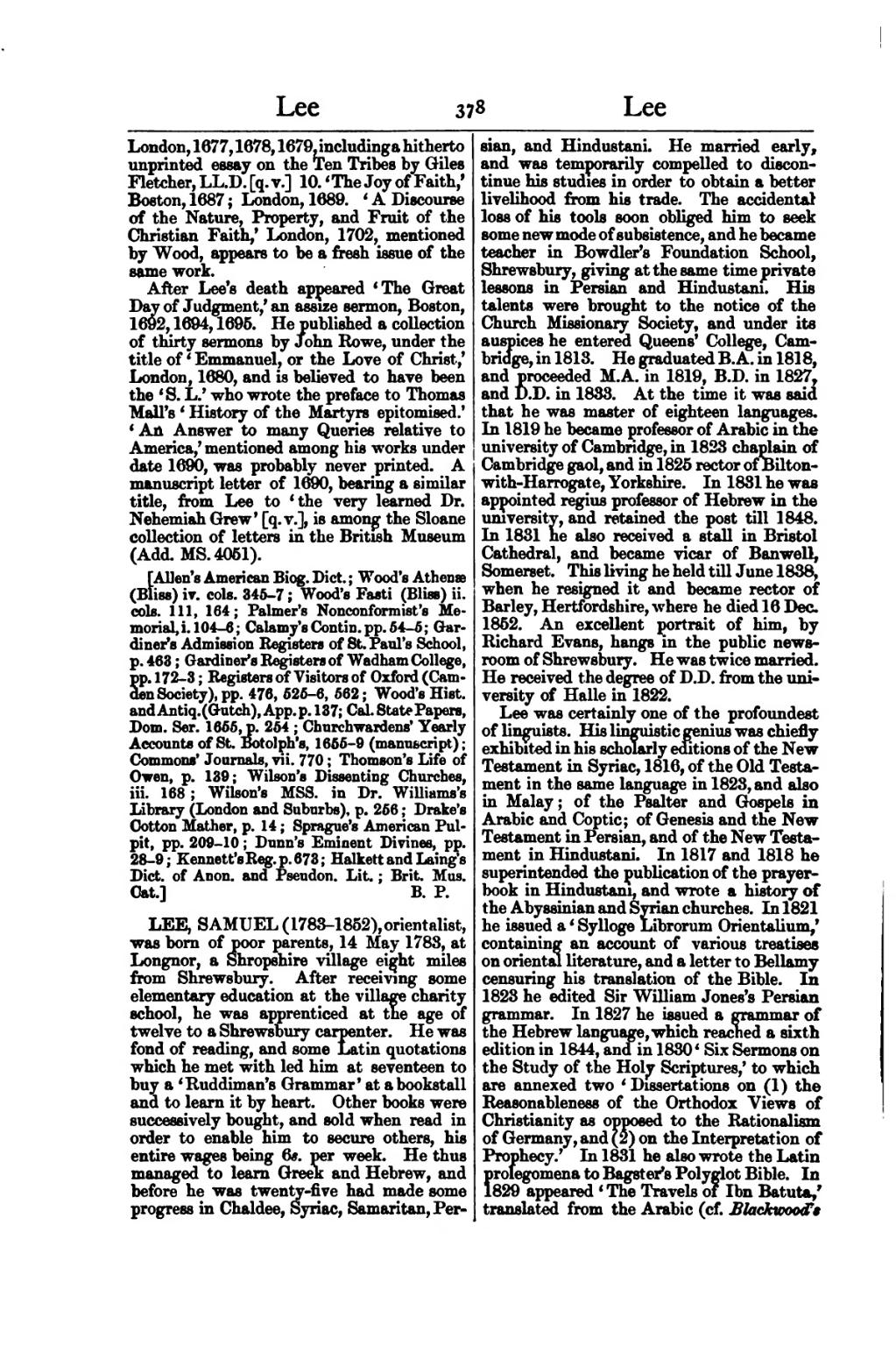London, 1677, 1678, 1679, including a hitherto unprinted essay on the Ten Tribes by Giles Fletcher, LL.D. [q. v.] 10. 'The Joy of Faith,' Boston, 1687; London, 1689. 'A Discourse of the Nature, Property, and Fruit of the Christian Faith,' London, 1702, mentioned by Wood, appears to be a fresh issue of the same work.
After Lee's death appeared 'The Great Day of Judgment,' an assize sermon, Boston, 1692, 1694, 1696. He published a collection of thirty sermons by John Rowe, under the title of 'Emmanuel, or the Love of Christ,' London, 1680, and is believed to have been the 'S. L.' who wrote the preface to Thomas Mall's 'History of the Martyrs epitomised.' 'An Answer to many Queries relative to America,' mentioned among his works under date 1690, was probably never printed. A manuscript letter of 1690, bearing a similar title, from Lee to 'the very learned Dr. Nehemiah Grew' [q. v.], is among the Sloane collection of letters in the British Museum (Add. MS. 4051).
[Allen's American Biog. Dict.; Wood's Athenæ (Bliss) ii. cols. 345-7; Wood's Fasti (Bliss) ii. cols. 111, 164; Palmer's Nonconformist's Memorial, i. 104-6; Calamy's Contin. pp. 54-5; Gardiner's Admission Registers of St. Paul's School, p. 463; Gardiner's Registers of Wadham College, pp. 172-3; Registers of Visitors of Oxford (Camden Society), pp. 476, 525-6, 562; Wood's Hist. and Antiq. (Gutch), App. p. 137; CaL State Papers, Dom. Ser. 1655, p. 254; Churchwardens' Yearly Accounts of St. Botolph's, 1655-9 (manuscript); Commons' Journals, vii. 770; Thomson's Life of Owen, p. 139; Wilson's Dissenting Churches, iii. 168; Wilson's MSS. in Dr. Williams's library (London and Suburbs), p. 256; Drake's Cotton Mather, p. 14; Sprague's American Pulpit, pp. 209-10; Dunn's Eminent Divines, pp. 28-9; Kennett's Reg. p. 673; Halkett and Laing's Dict. of Anon, and Pseudon. Lit.; Brit. Mus. Cat.]
LEE, SAMUEL (1783–1852), orientalist, was born of poor parents, 14 May 1788, at Longnor, a Shropshire village eight miles from Shrewsbury. After receiving some elementary education at the village charity school, he was apprenticed at the age of twelve to a Shrewsbury carpenter. He was fond of reading, and some Latin quotations which he met with led him at seventeen to buy a 'Ruddiman's Grammar' at a bookstall and to learn it by heart. Other books were successively bought, and sold when read in order to enable him to secure others, his entire wages being 6s. per week. He thus managed to learn Greet and Hebrew, and before he was twenty-five had made some progress in Chaldee, Syriac, Samaritan, Persian, and Hindustani. He married early, and was temporarily compelled to discontinue his studies in order to obtain a better livelihood from his trade. The accidental loss of his tools soon obliged him to seek some new mode of subsistence, and he became teacher in Bowdler's Foundation School, Shrewsbury, giving at the same time private lessons in Persian and Hindustani. His talents were brought to the notice of the Church Missionary Society, and under its auspices he entered Queens' College, Cambridge, in 1813. He graduated B. A. in 1818, and proceeded M.A. in 1819, B.D. in 1827, and D.D. in 1833. At the time it was said that he was master of eighteen languages. In 1819 he became professor of Arabic in the university of Cambridge, in 1823 chaplain of Cambridge gaol, and in 1825 rector of Bilton-with-Harrogate, Yorkshire. In 1831 he was appointed regius professor of Hebrew in the university, and retained the post till 1848. In 1831 he also received a stall in Bristol Cathedral, and became vicar of Banwell, Somerset. This living he held till June 1838, when he resigned it and became rector of Barley, Hertfordshire, where he died 16 Dec. 1852. An excellent portrait of him, by Richard Evans, hangs in the public newsroom of Shrewsbury. He was twice married. He received the degree of D.D. from the university of Halle in 1822.
Lee was certainly one of the profoundest of linguists. His linguistic genius was chiefly exhibited in his scholarly editions of the New Testament in Syriac, 1816, of the Old Testament in the same language in 1823, and also in Malay; of the Psalter and Gospels in Arabic and Coptic; of Genesis and the New Testament in Persian, and of the New Testament in Hindustani. In 1817 and 1818 he superintended the publication of the prayerbook in Hindustani, and wrote a history of the Abyssinian and Syrian churches. In 1821 he issued a 'Sylloge Librorum Orientalium,' containing an account of various treatises on oriental literature, and a letter to Bellamy censuring his translation of the Bible. In 1823 he edited Sir William Jones's Persian grammar. In 1827 he issued a grammar of the Hebrew language, which reached a sixth edition in 1844, and in 1830 'Six Sermons on the Study of the Holy Scriptures.' to which are annexed two ' Dissertations on (1) the Reasonableness of the Orthodox Views of Christianity as opposed to the Rationalism of Germany, and (2) on the Interpretation of Prophecy.' In 1831 he also wrote the Latin prolegomena to Bagster's Polyglot Bible. In 1829 appeared 'The Travels of Ibn Batuta,' translated from the Arabic (cf. Blackwood's
